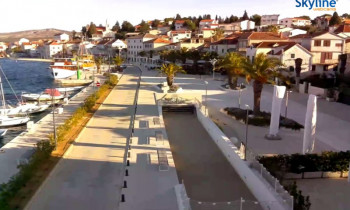2 webcams - Rogoznica
On the map you can find webcams from the Croatian resort Rogoznica. The town of Rogoznica is divided into two parts, connected by a bridge over the sea and there is a modern marina Marina Frapa.
Kliknutím na "bublinu" získáte informace o webkameře s možností prokliku na detail. Pro návrat na webové kamery z dalších obcí a měst zvolte v horním menu odkaz Chorvatsko.
Listing of webcams - Rogoznica

Webcam Rogoznica
Take a look at the Croatian town of Rogoznica and its surroundings with an ONLINE webcam. Webcam view of the waterfront of the popular resort of Rogoznica in Croatia. Rogoznica is located in the bay of…
- Show webcams nearby
- View: 14496x
- A02424

Webcam Rogoznica - Kneza Domagoja Coastal Promenade
Watch the Croatian resort of Rogoznica and its surroundings ONLINE with a webcam. Webcam view of Knez Domagoj Promenade in Rogoznica, which connects the harbor with the old town of Rogoznica. Rogoznica is located in…
- Show webcams nearby
- View: 8365x
- A07758
Map showing webcams in Sibenik-Knin County - Croatia. Do you know of any other cameras from the Croatian region of Sibenik-Knin County? Add this webcam to us.
Croatia with the official name of the Republic of Croatia is located on the Balkan Peninsula on the shores of the Adriatic Sea and on many islands in the Adriatic Sea. Neighboring countries are Slovenia, Hungary, Serbia, Bosnia and Herzegovina and Montenegro. Croatia has a Mediterranean climate on the coast and a continental in the inland. Dry and hot summers are a typical feature of Croatia.
The capital and largest city of Croatia is Zagreb with the typical character of a large city of the former Habsburg monarchy. The city of Zagreb lies at the foot of the Medvednica Mountains, north of Croatia's longest river, the Sava. The individual regions of Croatia are administratively divided into 20 counties and the capital Zagreb with the same status.
The Croatian economy is dominated by tourism thanks to the tourist boom of the late 1990s. For many European countries, Croatia is one of the most popular holiday destinations. Tourists are mainly looking for the rugged Adriatic coast with many islands. The traditional place to stay by the sea is the Makarska Riviera and the Split area in Dalmatia. Furthermore, tourists often visit historic cities that are full of ancient monuments from Roman times and from the times of Venetian rule such as Dubrovnik, Split, Zadar, Sibenik, Trogir or Rijeka. In the inland is the most visited tourist destination Plitvice Lakes National Park.
Croatia is a land of sun, sea and relaxation, with more than 1,000 islands of various sizes from very small cliffs to islands with an area of over 400 km². Popular are the islands such as Krk, Cres, Hvar, Korcula and Rab, which thanks to its sandy beaches are among the most attractive islands in the area. On the Croatian islands you will find residential offers such as Robinson Crusoe type. This is accommodation in a quiet secluded place surrounded by wildlife, mostly in former fishing houses in remote parts of the islands. The Adriatic Sea also offers great opportunities for divers and yachtsmen. The most famous localities are Rogoznica, Primošten, Kvarner Bay, the islands of Jabuka, Vis, Rogoznica and Male Srakane, where the shipwreck is Baron Gautsch.
The Adriatic coast offers a plethora of private accommodation in apartments right by the sea or in the historic parts of picturesque towns such as Primosten. The Croatian Adriatic is an ideal summer destination for nudism fans. The most famous naturist beaches include: FORTUNA, ZELENA LAGUNA, POLARI - PUNTA EVA, VEŠTAR, MAŠKIN.
Croatia has a very rich cuisine. The basic ingredients are meat, fish, dairy products, vegetables and nuts. Meals often vary by region. The most famous include: Istrian Fiji with tubers, Lamb on a whisk, Brudet, Buzara, Grilled fish, Fiš paprikaš, Pršut, Cheese from the island of Pag and Štrukli. Croatia is also famous for its ice cream, which you should definitely taste on holiday.
Now to the Croatian monuments inscribed on the UNESCO list of monuments. The most important is the early Byzantine monument of the Eastern Mediterranean the Euphrasian Basilica in Poreč, Istria. Then the Cathedral of St. Jakov in Šibenik, which was built only of stone - limestone and Brač marble. The historic core of Trogir has been preserved in almost its original form from the 13th to the 18th century, where each house inside the walls has its own coat of arms and inscription. Furthermore, the city of Dubrovnik, which is surrounded by two kilometers long walls belonging to the largest defensive fortifications in Europe. The most important ancient building in all of Croatia is Diocletian's Palace in Split, built in the 4th century by Emperor Diocletian as his seat and at the same time a defensive fortress. A system of sixteen karst lakes Plitvice Lakes, which are arranged in steps of each other in a length of about 7 km and connected by 92 waterfalls falling from a height of 3-76 meters. Starigradsko polje on the island of Hvar, where it was preserved the division of land from 2500 years ago of Greek colonizers. The last inscription on the UNESCO list protects unique medieval tombstones (Stećci) from the 13th - 16th century.